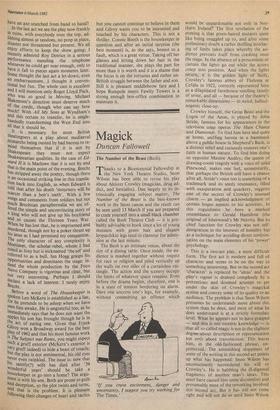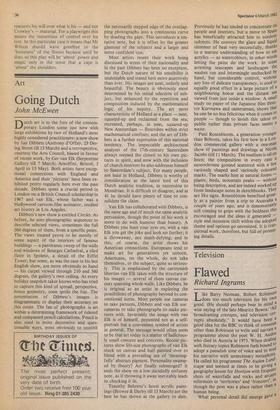Magick
Duncan FaHowell
The Number of the Beast (Bush) Thanks to a Bicentennial Fellowship at the New York Theatre Studio, Snoo Wilson has been able to revise his play about Aleister Crowley (magician, drug ad- dict, and bestialist). Due largely to its in- trinsically engaging subject matter, The Number of the Beast is the best-known work in the Snoo canon and the result can be seen until 13 March if you are prepared to cram yourself into a small black chamber called the Bush Theatre Club — it is pro- bably advisable to book since a lot of young mutants with green hair and elegant leopardskin legs tend to clamour for admis- sion at the last minute.
The Bush is an intimate venue, about the size of a dining table. Once inside, the au- dience is mashed together without respect for race or religion and piled vertically up the walls on two sides of a curtainless rec- tangle. The action and the scenery occupy, the limits of whatever space remains. Even before the drama begins, therefore, one is in a state of tension bordering on alarm. Dare one uncross one's legs, for example, without committing an offence which
`If you crave excitement, danger and uncertainty, I suggest you try working for The Times.' would be unpardonable not only in Nor- thern Ireland? The first revelation of the evening is that green-haired mutants quite like being snuggled up to, and after some preliminary doubt a rather thrilling interlac- ing of limbs takes place whereby the au- dience prevents itself from crashing onto the stage. In the absence of a proscenium or curtain the lights go out while the actors creep into position. And when the lights return, it is the golden light of Sicily, Crowley's famous abbey of Thelema at Cefalu in 1922, correctly represented here as a dilapidated farmhouse smelling faintly of urine, and all — because of the theatre's remarkable dimensions — in weird, halluci- nogenic close-up.
Crowley himself, the Great Beast and the Logos of the Aeon, is played by John Stride, famous for his ,appearances in the television soap operas The Main Chance and Diamonds. To find him here and quite at home, sniffing heroin in a hammock above a public house in Shepherd's Bush, is a distinct relief and curiously restores one's faith in human nature. To find him doing so opposite Maxine Audley, the queen of drawing-room tragedy with a voice of solid Pinewood, makes one feel, momentarily, that perhaps the British still have a chance after all. Stride's voice too is something of a trademark and its seedy resonance, filled with exasperation and quackery, suggests one of the secrets of Crowley's unusual charm — an implied acknowledgment of certain bogus aspects to his activities. In this roguishness he bore a marked resemblance to Gerald Hamilton (the original of Isherwood's Mr Norris). But its chief function for Crowley was not self- denigration in the interests of humility but as a technique for avoiding direct confron- tation on the main elements of his 'power' psychology.
This is a two-act play, a most difficult form. The first act is modern and full of character and seems to be on the way to something interesting. But in the second act `character' is replaced by 'ideas' and the play's vigour is drained completely by a pretentious and doomed attempt to get under the skin of Crowley's magickal system and convey some of its quality to an audience. The problem is that Snoo Wilson presumes he understands more about this system than he does, and most of what he does understand is at a strictly formulaic level. What he appears not to have grasped — and this is not esoteric knowledge — is that all so-called magic is not in the slightest degree about description or representation but only about transmission: This leaves him, in the old-fashioned phrase, un- protected. The astonishing sloppiness of some of the writing in this second act points up what has happened: Snoo Wilson has unconsciously surrendered his will to Crowley's. He is babbling the ill-digested fragments of another man's ideas. This must have caused him some discomfort and presumably most of the reworking involved this second act. But it has still not come right and will not do so until Snoo Wilson
reasserts his will over what is his — and not Crowley's — material. For a playwright this means the reassertion of control over his text. In this particular case it means that Mr Wilson should wave goodbye to the `looseness' of the Sixties because until he does so this play will be 'about' power and magic only in the sense that a cape is `about' the shoulders.







































 Previous page
Previous page